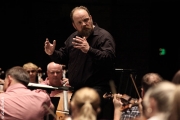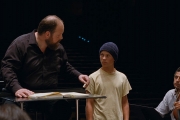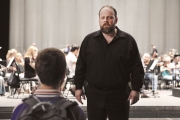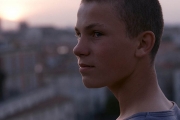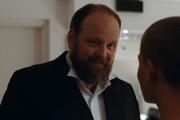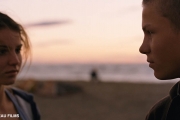Victor, 13, lives alone with his mother in a makeshift house on the beach. He has never met his father, a famous orchestra director. When his father is invited to direct the Sixth Symphony by Gustav Mahler in Montpellier, Victor observes his rehearsals from afar and discovers the world of classical music. The day his mother Nadia announces they will leave the city, Victor decides to reveal his existence to his father . . .
Cast & Crew
Director • Alix Delaporte
Screenwriters • Alix Delaporte and Alain Le Henry
Director of Photography • Claire Mathon
Producer • Hélène Cases
Starring :
Romain Paul, Clotilde Hesme, Grégory Gadebois…
Choose a picture to see the filmography (source : IMDB)
![]()
Why this title “The Last Hammer Blow“?
I knew from the beginning that the father’s character would be an orchestra conductor. So next I had to choose the piece that he would be conducting. I discovered the story behind Gustav Mahler’s Sixth Symphony before I had even heard it. I was intrigued by the “fictional” aspect of the three hammer strokes at the end of the symphony. It is believed that after the death of his daughter, his expulsion from the Vienna Opera and a diagnosis of a heart condition, Mahler would have linked these three strokes of fate with the strokes of the hammer in his symphony, and may have thus removed the last stroke out of superstition . . .
How did you choose the young actor Romain Paul?
When I saw his audition tapes among ten or so other teenagers’, it was his gaze that caught my eye. The sincerity of his gaze, its depth as well, and at the same time, the expanse this gaze allows for our interpretation. It makes you want to try to understand what is going on in his head. Romain had no idea what acting was; he did not know anything about the field, and personally, I had never directed a teenager. In his auditions, what struck me was how attentive he was to what his mother’s character was telling him; he was not trying to simply “place” his lines. Also, what really surprised me was the fact that he never lowered his eyes when he talked to the other actors, particularly to his father, played by Grégory Gadebois. He maintained eye contact, barely even blinking. For him, it was a form of consideration, of respect; we listen to the people who are speaking to us by looking them in the eyes.
Your characters do not speak much . . . In The Last Hammer Blow, gestures often replace dialogue.
This was not specifically intended, it was just an evidence. Whether it is for Grégory who uses his hands to conduct the orchestra, for Clotilde whose body expresses her illness, or for Victor who is constantly in motion. In these moments, the viewer is drawn in. Because, wherever there are gaps, we are inevitably compelled to fill them with parts of ourselves, with our imagination, our subjectivity . . . This is why music is important; it unfolds the internal feelings of the characters. It also replaces the words.
How did you envision the scenes of the orchestra practicing?
For Claire Mathlon, the film cinematographer and myself, it was important to stay at the level of Victor, and thus, at the level of someone who does not understand anything about classical music. In his desire to gain his father’s recognition, there is something intrusive that allows us to penetrate a world – the orchestra rehearsals – which is seldom accessed. Through his eyes, we discover how orchestra rehearsals are organized, how little by little the concert becomes possible. At first, Victor’s interest is directed to people, before trying to understand music. He captures the gazes exchanged by the musicians; he clings to the familiar. The music comes to him in fragments. Thanks to his father and to his own tenacity, he begins to understand it and to hear it in its entirety. He allows it to penetrate his world, the place where he lives. He makes his mother listen to the symphony. Through it, he creates a connection between his parents. In fact, the film becomes more and more musical.
Why the Sixth Symphony in particular?
While listening to Mahler’s Sixth Symphony, I was struck by the third movement, some measures that for me conveyed Victor’s profound feelings, some measures of an absolute romanticism which contrasted with the harshness of the rest of the symphony, or in any case with all its complexity. Actually, it is perhaps over this romanticism that the orchestra conductor stumbles: he focuses on this passage, looks for something that he cannot find, to the extent of giving contradictory orders to his orchestra. He orders: “Play drier”, but indicates the contrary with his hands. Focusing on a detail is also a way of not acknowledging the huge wave which is going to overwhelm the person about to conduct Mahler’s Sixth Symphony, or . . . to direct a film . . . An hour and twenty minutes of music, a work which demands an energy, an endurance comparable to those required when making a film. When directing, I also have a tendency to ask for more dryness, while seeking the opposite effect . . .
Press Kit “Le dernier coup de marteau”
English ~ 3 pages ~ 348 Ko ~ pdf
Press Kit “Le dernier coup de marteau”
French ~ 9 pages ~ 281 Ko ~ pdf





